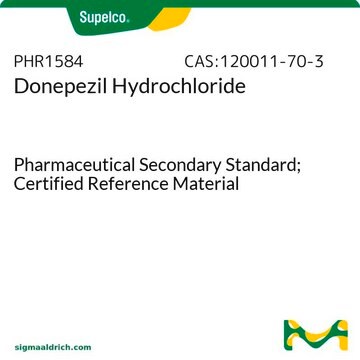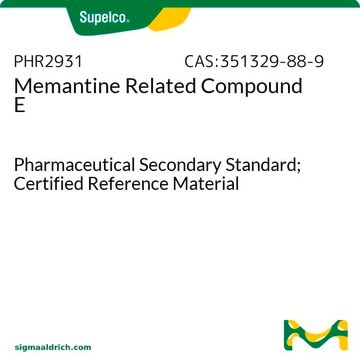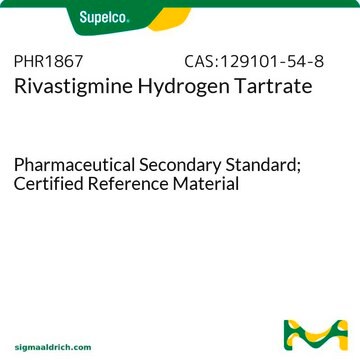PHR1886
Memantine Hydrochloride
Pharmaceutical Secondary Standard; Certified Reference Material
Synonym(s):
Memantine hydrochloride, 3,5-Dimethyl-1-adamantanamine hydrochloride, 3,5-Dimethylamantadine hydrochloride, 3,5-Dimethyltricyclo[3.3.1.13,7]decan-1-amine hydrochloride
About This Item
Recommended Products
grade
certified reference material
pharmaceutical secondary standard
Quality Level
Agency
traceable to USP 1380502
API family
memantine
CofA
current certificate can be downloaded
packaging
pkg of 1 g
technique(s)
HPLC: suitable
gas chromatography (GC): suitable
application(s)
pharmaceutical (small molecule)
format
neat
storage temp.
2-30°C
SMILES string
Cl.C[C@]12CC3C[C@](C)(C1)CC(N)(C3)C2
InChI
1S/C12H21N.ClH/c1-10-3-9-4-11(2,6-10)8-12(13,5-9)7-10;/h9H,3-8,13H2,1-2H3;1H/t9-,10+,11-,12-;
InChI key
LDDHMLJTFXJGPI-VXMZOEJHSA-N
Looking for similar products? Visit Product Comparison Guide
Related Categories
General description
Memantine Hydrochloride is a drug used for treating the Alzheimer′s disease by means of reducing abnormal activity in the brain. It can help patients suffering from dementia as it assists them to think more clearly and perform their chores with ease.
Application
Analysis Note
Other Notes
Footnote
related product
Storage Class Code
11 - Combustible Solids
WGK
WGK 3
Flash Point(F)
Not applicable
Flash Point(C)
Not applicable
Choose from one of the most recent versions:
Already Own This Product?
Find documentation for the products that you have recently purchased in the Document Library.
Customers Also Viewed
Our team of scientists has experience in all areas of research including Life Science, Material Science, Chemical Synthesis, Chromatography, Analytical and many others.
Contact Technical Service











